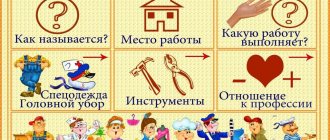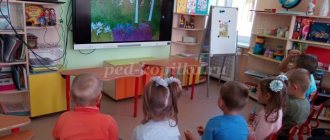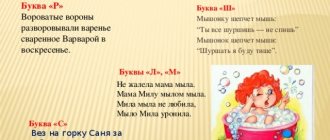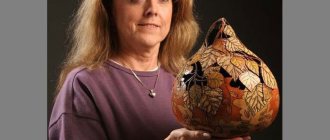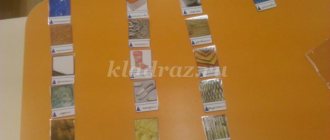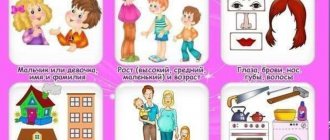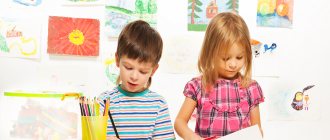General recommendations for conducting speech therapy classes on the topic “Professions” in a preschool educational institution
When conducting a speech therapy session “Professions”, it is important to take into account the characteristics of children’s perception. Children do not yet have self-discipline skills. Therefore, it is important that the activity is playful in nature and captivates them.
Developmental activities for classes
When conducting classes, not only games can be used that expand the children’s knowledge, but also exercises to learn how to correctly pronounce sounds in words and improve speech skills. It is recommended that you plan your children's learning in the coming weeks.
Games on the topic: “Professions”
In this case, riddles and questions are asked, the answers to which expand the children’s knowledge about various specialties. Sometimes false statements are made so that kids will find a mistake.
Stories relating to various specialties are compiled.
List of reading materials for the group
When lexical topics in speech therapy related to professions are considered, for example, reading the following works can be used to work with children:
- J. Rodari “What color are the crafts.”
- Y. Akim “Neumeika”.
- A. Shibarev “Mailbox”.
Note! Reading and discussing works of fiction will help children better understand the topic they are studying. It is useful if such readings are additionally carried out by their parents at home.
Thematic physical education minute
The following describes one example of physical education.
Kids perform movements while the teacher reads the poem “Postman”:
What the postman brought us (Clenches his fists)
He walks around with a thick bag
Translation, magazine, newspaper
There are two cassettes in the parcel (Kids straighten and bend their fingers)
And a letter from Aunt Valya
So that they await her arrival (Hands spread to the sides).
Gymnastic exercises
Typically, physical exercises and finger gymnastics are used during classes. At the same time, the teacher reads a poem related to the topic under consideration. At certain moments, children perform movements that relate to the spoken phrases. If necessary, the teacher tells you what to do.
Using interactive whiteboards and ICT in the learning process
The use of ICT makes it possible to offer children exciting educational computer games.
For example, they may be offered pictures of people and objects that they use in their work. At the same time, children will have to describe in words what is shown in the pictures and write a short story about this profession. The use of computer technology can expand the learning opportunities for preschool children. However, it is necessary to teach children to work with it in subgroup classes.
Age characteristics and correction of speech disorders during group classes
Knowledge of the peculiarities of the lives of adults related to their work is vital for children, but at different ages the approach to studying issues related to professions should be different. He must take into account the age characteristics of the children.
Poster about different professions
Lexical topic “Professions” in the middle group
Classes in the middle group not only develop speech skills, but also provide basic knowledge about what professions are and what they are like.
Purpose and objectives of the lesson: getting acquainted with different professional specialties
The following tasks are performed:
- When working with children, they are given the concept that there are different professions and are told about their main features.
- Vocabulary develops, articulation improves when pronouncing sounds.
- Children develop auditory attention and logical thinking.
It is recommended to plan classes for the near future.
Brief lesson plan
Finger gymnastics is performed with children. It is done as follows:
The use of mnemonics in the development of speech in preschool children
There are many noble professions (In this case, in turn, each finger of the right hand is connected to the thumb).
Both useful and pleasant (Make the same movements with the fingers of your left hand).
Cook, doctor, painter, teacher, salesman, miner, builder (Connect the fingers of the left hand and right hand with the thumbs).
I don’t name everyone at once (at the same time, the kids clench and unclench their fists several times).
I suggest you continue (children stretch their arms forward, keeping their palms facing up).
Next, the teacher conducts a poetic dialogue with the kids: “Was there a shoemaker?/Was!/Sewed boots?/Sewed!/Who are the boots for?/For the neighbor’s cat!” This exercise is designed to improve the clarity of diction and work on the expressiveness of the pronunciation of sentences.
The lesson uses tongue twisters to develop clarity of pronunciation and correct pronunciation of various sounds. At the same time, the teacher and the children try to pronounce certain phrases. Here is an example of a tongue twister: “The leaking faucet really wants the plumber to fix it.”
Important! Throughout the lesson, children are given a variety of vocabulary exercises.
Thematic poems and tongue twisters
The poetic form of presenting material to children helps them better assimilate the material. Therefore, it is important to use poems and read them aloud to the teacher together with the children. One of the exercise options is to ask poetic riddles.
Here are some examples:
- “Doctor, but not for children, but for birds and animals. He has a special gift. This doctor..." (Vet).
- “We teach children to read and write. Love nature, respect the elderly." (Teacher).
- “At work, day after day, he commands with his hand. That hand raises. A hundred pounds under the clouds." (Crane operator at a construction site).
Tongue twisters not only allow you to improve your vocabulary, but also provide an opportunity to improve children’s diction.
The following tongue twisters can be used:
- “Sailors in sailor suits. Sailor suits in stripes."
- “Two woodcutters, two woodcutters are chopping wood with axes in the yard.”
- “The weaver is weaving fabric for Tanya’s dress.”
When working with children in a speech therapy lesson on the topic “Professions,” the following game can be used. It's called "Fable Poems."
Its goals are: improving auditory attention, improving the ability to think logically, and developing children’s vocabulary related to the topic of professions.
The game consists of reading poems about the professions of adults to children, and in them the teacher makes erroneous statements. Kids are required to determine what is true and what is not. At the same time, the speech therapist and children discuss the answers in detail.
Lexical topic “Professions” in the senior group
Important! At this age, children are able to master not only basic concepts about various specialties, but also begin to create general ideas about the world of adults and the place that professional activity occupies in it.
Objectives of the lesson: forming a holistic picture of the world
Children are taught to briefly talk about their professions. During the lesson, they learn more about the types of activities adults do. When assignments are completed for children in the speech therapy group on the topic “Professions,” children are taught that work is necessary and its social significance is explained.
Kids are trained to form masculine and feminine words from the names of workers (military and military, teacher and teacher).
Note! Children develop the ability to recognize speech by ear, improve visual perception and attention. They are helped to develop memory, attention and the ability to speak coherently.
Children are encouraged to be active, take initiative, and have the ability to work collectively.
Lesson outline
When considering lexical topics in the senior group, a thematic physical education session first takes place.
A conversation is held about what a profession means for an adult. They talk about how there are different professions and give relevant examples. They talk about the need to earn money to buy household items that the family needs.
Peculiarities of mastering the sound aspect of speech by preschoolers
The story is told on behalf of the kids who were arguing about whose profession was more important. The teacher and children discuss this dispute and give their answers.
A rhyming game is being played. For example, phrases are uttered about professions related to transport: “The train is driven by ... (driver). Plowing the field... (Tractor driver)..." Children must complete each phrase.
Children take cards out of envelopes and see pictures of a person working. They should talk about his specialty.
Children, with the help of a teacher, compose their stories about various professions, guided by a rough plan and pictures.
A physical education session is held. At the same time, poems about professions are read, during which children imitate the corresponding movements.
The teacher gives phrases, and the children guess who could say them.
Kids are asked to name workers in masculine and feminine genders (for example, pilot).
In conclusion, the results are summed up, the teacher reminds the children what new they have learned.
Game technologies in education
In the process of working with children, lexical exercises are actively used and physical education sessions are held. Children are taught to independently compose simple stories about various specialties. Questions and riddles are actively used, to which children must find the answer.
Lexical topic “Professions” in the preparatory group
At this age, it is important to prepare people for school, to give them knowledge of how adults live.
Purpose and objectives of the lesson
In classes with preschoolers, it is necessary not only to expand the vocabulary related to the topic under consideration, but also to form their horizons, make knowledge more systematic, develop children’s communication skills, and the ability to coherently express their thoughts.
Activities
At this time, physical education and game moments are still important, but the formation of an outlook, the ability to express one’s thoughts and the ability to conduct a focused dialogue with other people are of particular importance.
Preliminary work on studying literary material
The teacher tells the children about descriptions of various workers that are available in children's literature.
The children read aloud thematic literary works.
Equipment
When the lexical topic “Professions” is considered in the preparatory group, pictures are needed as handouts. They should depict representatives of various professions.
Note! The teacher should have prepared demonstration images on the topic of the lesson. A board or screen can be used on which visual material will be shown.
Summary of a comprehensive speech therapy lesson in the senior group on the topic “Professions in kindergarten”
Summary of a comprehensive speech therapy lesson in the senior group for children with special needs on the topic “Professions in kindergarten”
Author: Speech therapist teacher, Svetlana Vyacheslavovna Klokova. Description. The outline of a speech therapy lesson will be of interest to speech therapists, special education teachers and parents. The summary is written in detail and contains the children's expected answers. The lesson belongs to the second period of study. The summary was written for children with speech development level 3 ODD. This comprehensive lesson is conducted with children of the entire group. Children go on an excursion together with a speech therapist, a teacher and an assistant teacher. After this class, there are no other group classes that day. The speech therapist works individually. Goal: To clarify and expand children’s knowledge about professions in kindergarten. Correctional educational tasks: Activation of the dictionary on the topic “Professions in kindergarten.” Clarification of ideas about the professions of people working in kindergartens. Improving the grammatical structure of speech. Improving the skills of syllabic analysis and synthesis. Corrective and developmental tasks. Develop phonemic awareness, visual attention and perception, speech hearing, coherent speech, thinking, memory, articulatory, fine and gross motor skills. Correctional and educational tasks. Cultivate goodwill, mutual understanding, cooperation skills, initiative, and independence. Equipment. Presentation on the topic, computer, TV, plot pictures on the topic. Progress of the lesson. 1. Organizational moment. The speech therapist announces the topic of the lesson. Speech therapist . Children, today we will go on a tour of the kindergarten. Let's meet the people working in our kindergarten, find out what they do and what their profession is called. Please tell me, children, how do polite people behave when visiting? (They say hello, don’t touch anything without permission, don’t make noise or be naughty). I ask you to remember to say hello, thank you for the story, and say goodbye to the people we will see in kindergarten. 2. Tour of the kindergarten. (Visiting the offices of the manager, nurse, laundry, kitchen and becoming familiar with the equipment, devices, tools). 3. Conversation on the topic “Professions in kindergarten.” Adults bring children into a group room and invite them to sit on chairs in front of a television screen. (A presentation on the topic is included). Speech therapist. Guys, we went on a tour of the kindergarten. Let's remember the places where we have been and what we have seen. We'll tell you. who does what in kindergarten and what are the names of the professions. 1 child. This is the manager's office. She has a computer on her desk. She manages the work of the entire kindergarten. Accepts children to kindergarten and adults to work. 2 child. This is a medical office. There are scales, a cabinet with bandages, cotton wool, syringes and medicines. The nurse here administers vaccinations, takes temperatures, and treats bruises and abrasions. 3 child. It's a kitchen. A cook works there. He cooks delicious food for breakfast, lunch and dinner. You need to be very careful here, because there are hot dishes on the stove: pots, pans. 4 child. This is a laundry room. Here the laundress washes clothes in a washing machine and irons them. 5 child. This is a gym. Physical education classes take place here. The physical teacher conducts them. The hall has balls, jump ropes, a ladder, a rope, and benches. The guys in the gym learn to be strong, dexterous, and brave. Here they run, jump, tumble, and play sports games. 6 child. This is a music room. Here the music director teaches children to sing, dance, and listen to music. The hall has a synthesizer, piano and other musical instruments. 7 child. This is the speech therapist's office. There are tables and chairs here. There is a board and a computer. There are many different games and toys in the closet. A speech therapist teaches children to speak beautifully. Teaches reading and writing. 8 child. This is our group. Here we play, eat and study with our teachers. They teach us to draw, sculpt, cut, count and speak. The teacher's assistant brings food from the kitchen, washes the dishes, the floor, makes the beds in the bedroom, and helps the children get dressed for a walk. Speech therapist. Well done guys, you spoke very well about the people and their professions working in kindergarten. You saw and learned a lot of new and interesting things today. Guys, who keeps the streets clean and tidy? (Street cleaner). What does he do? Children. The janitor clears snow from snow in winter, and leaves and debris from paths and areas in summer and spring. 4. Educator. Let's stand in a circle and play the game "Who needs this for work?" with the ball. Broom for the janitor Washing powder for the laundress Saucepan for the cook Mirror for the speech therapist Computer for the manager Mop for the assistant teacher Jump rope for the physical instructor Piano for the music director Board game for the teacher Syringe for the nurse 5. Speech therapist. Let's play the game "walk by syllables." Stand in a single row along the edge of the carpet. The task will be next. You look at the picture, name your profession and “step through” this word syllable by syllable. (The teacher shows plot pictures: speech therapist, cook, teacher, laundress, janitor). 6. End of class. (Assessment of children's work).
We recommend watching:
Entertainment for children of the preparatory group on the topic: Professions Summary of a lesson on cognitive development in the senior preparatory group of a preschool educational institution on the topic: “All p Summary of a lesson in the 1st junior group on the topic “Getting to know the professions.” Profession: doctor Summary of GCD in the senior group on the topic: Professions
Similar articles:
Poems about professions for preschool children. Senior group
Conversation about medical workers with preparatory group children
Lesson notes for the middle group. Doctor - dentist
Lesson summary for the middle group “Profession cook”
Lesson notes for the senior group. Who is treating us
